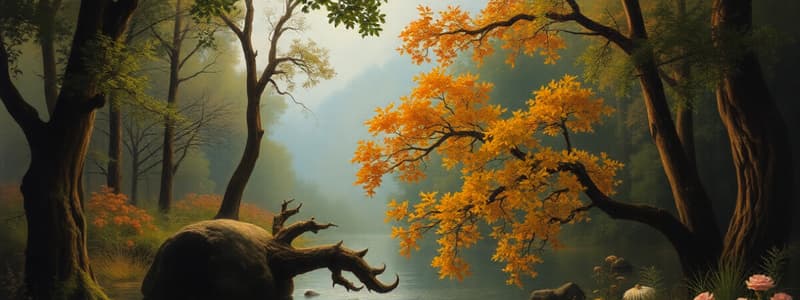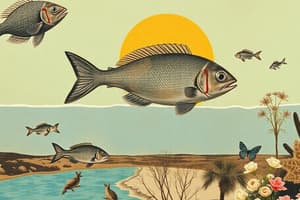Podcast
Questions and Answers
What is the primary effect of DDT accumulation in birds as a result of biomagnification?
What is the primary effect of DDT accumulation in birds as a result of biomagnification?
- Reduced reproductive rates
- Increased mating opportunities
- Fragility in their eggshells (correct)
- Enhanced foraging ability
Which apex consumer has been identified as having the highest concentration of PCBs in the aquatic ecosystem studied?
Which apex consumer has been identified as having the highest concentration of PCBs in the aquatic ecosystem studied?
- Largemouth bass
- Bluegill
- Walleye (correct)
- Trout
Which of the following substances is NOT mentioned as biomagnifying in aquatic ecosystems?
Which of the following substances is NOT mentioned as biomagnifying in aquatic ecosystems?
- Heavy metals
- Radon (correct)
- PCBs
- DDT
What recommendation does the Environmental Protection Agency (EPA) give concerning fish consumption for pregnant women and young children?
What recommendation does the Environmental Protection Agency (EPA) give concerning fish consumption for pregnant women and young children?
How does the concentration of toxic substances behave as it moves up trophic levels in aquatic ecosystems?
How does the concentration of toxic substances behave as it moves up trophic levels in aquatic ecosystems?
Which species is recommended for consumption due to its lower mercury content?
Which species is recommended for consumption due to its lower mercury content?
What do organisms in an ecosystem primarily compete for?
What do organisms in an ecosystem primarily compete for?
Which ecosystem type covers the largest portion of Earth's surface?
Which ecosystem type covers the largest portion of Earth's surface?
What is a key characteristic of deep ocean water ecosystems?
What is a key characteristic of deep ocean water ecosystems?
Which of the following biomes is characterized primarily by tropical rainforests?
Which of the following biomes is characterized primarily by tropical rainforests?
What percentage of the Earth's surface is comprised of freshwater ecosystems?
What percentage of the Earth's surface is comprised of freshwater ecosystems?
What role does phytoplankton play in the marine ecosystem?
What role does phytoplankton play in the marine ecosystem?
What primarily defines a biome?
What primarily defines a biome?
Which of the following is a feature of freshwater ecosystems?
Which of the following is a feature of freshwater ecosystems?
What is a significantly limiting factor for organisms within a habitat?
What is a significantly limiting factor for organisms within a habitat?
What is the role of producers in a food chain?
What is the role of producers in a food chain?
Which of the following correctly defines an apex predator?
Which of the following correctly defines an apex predator?
How does energy transfer between trophic levels in a food chain?
How does energy transfer between trophic levels in a food chain?
What is a key limitation of using food chains to describe ecosystems?
What is a key limitation of using food chains to describe ecosystems?
Which organisms are classified as heterotrophs?
Which organisms are classified as heterotrophs?
What is biomagnification?
What is biomagnification?
What is the primary energy source for photoautotrophs?
What is the primary energy source for photoautotrophs?
Which trophic level consists mainly of herbivores?
Which trophic level consists mainly of herbivores?
In a food web, which of the following best represents the variety of feeding relationships?
In a food web, which of the following best represents the variety of feeding relationships?
What is the function of decomposers in a food chain?
What is the function of decomposers in a food chain?
Flashcards are hidden until you start studying
Study Notes
Competition in Ecosystems
- Organisms compete for limited resources like food, water, sunlight, space, and nutrients.
- These resources are essential for energy production and physical structure.
- Competition occurs within a single species and between different species.
Environmental Factors
- Climate (seasons, sunlight, rainfall), elevation, and geology play a vital role in determining which organisms can survive in a specific area.
Ecosystem Classification
- There are three main categories: freshwater, marine, and terrestrial.
- Freshwater ecosystems (lakes, rivers, streams, springs) are the least common, covering only 1.8% of the Earth's surface.
- Marine ecosystems are the most common, covering 75% of the Earth's surface and encompassing shallow oceans, deep ocean water, and deep ocean bottom.
- Terrestrial ecosystems are diverse and grouped into biomes, large-scale communities defined by dominant plant types in specific climatic regions.
Food Chains and Food Webs
- Food chains represent linear sequences of organisms through which energy and nutrients flow.
- Trophic levels (energy levels) are defined as producers, primary consumers, secondary consumers, tertiary consumers, and apex predators.
- Energy is lost at each trophic level, with about 10% transferred to the next level.
- Food webs account for complex interactions between multiple species and trophic levels, providing a more accurate representation of energy flows within ecosystems.
Energy Acquisition in Food Webs
- Autotrophs (plants, algae, some bacteria) produce their own food using energy from sunlight (photosynthesis).
- Heterotrophs (animals, humans) obtain energy by consuming other organisms, ultimately relying on autotrophs for their energy source.
Biomagnification
- Persistent toxic substances accumulate in organisms at higher trophic levels through biomagnification (bioaccumulation).
- This is a consequence of organisms consuming multiple individuals from lower trophic levels, resulting in concentrated levels of the substance in apex predators.
- DDT, PCBs, and heavy metals like mercury, lead, and cadmium are examples of substances that biomagnify.
- Biomagnification impacts human health, influencing food recommendations and environmental regulations.
Photosynthesis
- Photosynthesis is the process used by autotrophs to convert light energy into chemical energy (carbohydrates).
- Plants, algae, and some bacteria perform photosynthesis.
- Photosynthesis provides the foundation of food chains and is essential for life on Earth.
Studying That Suits You
Use AI to generate personalized quizzes and flashcards to suit your learning preferences.




